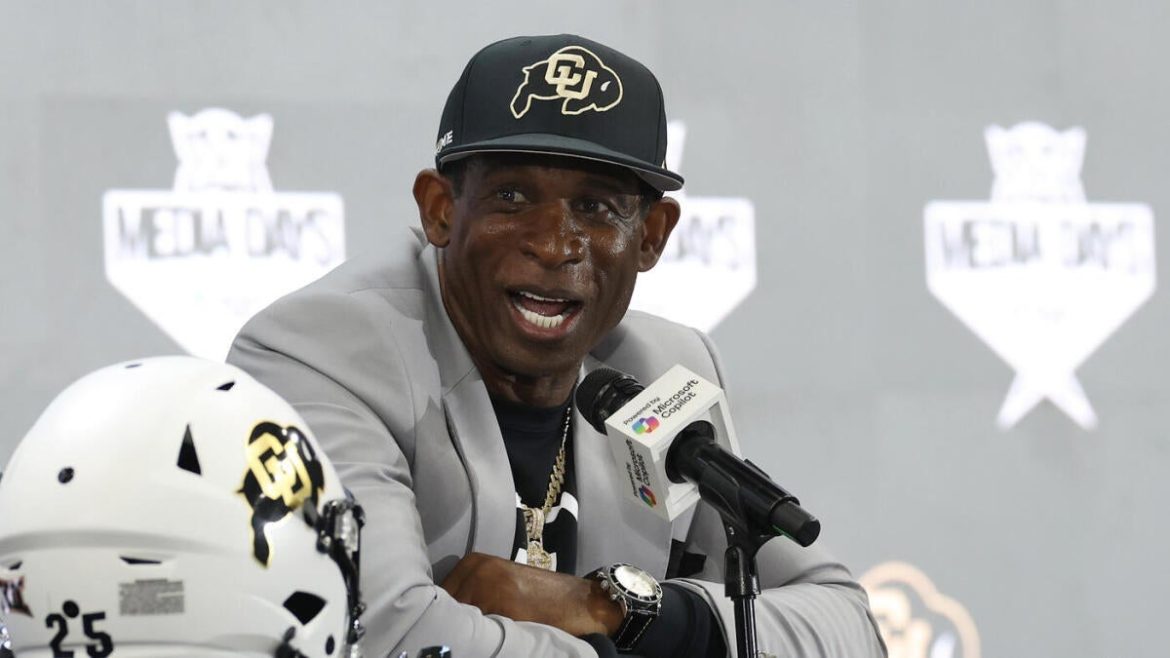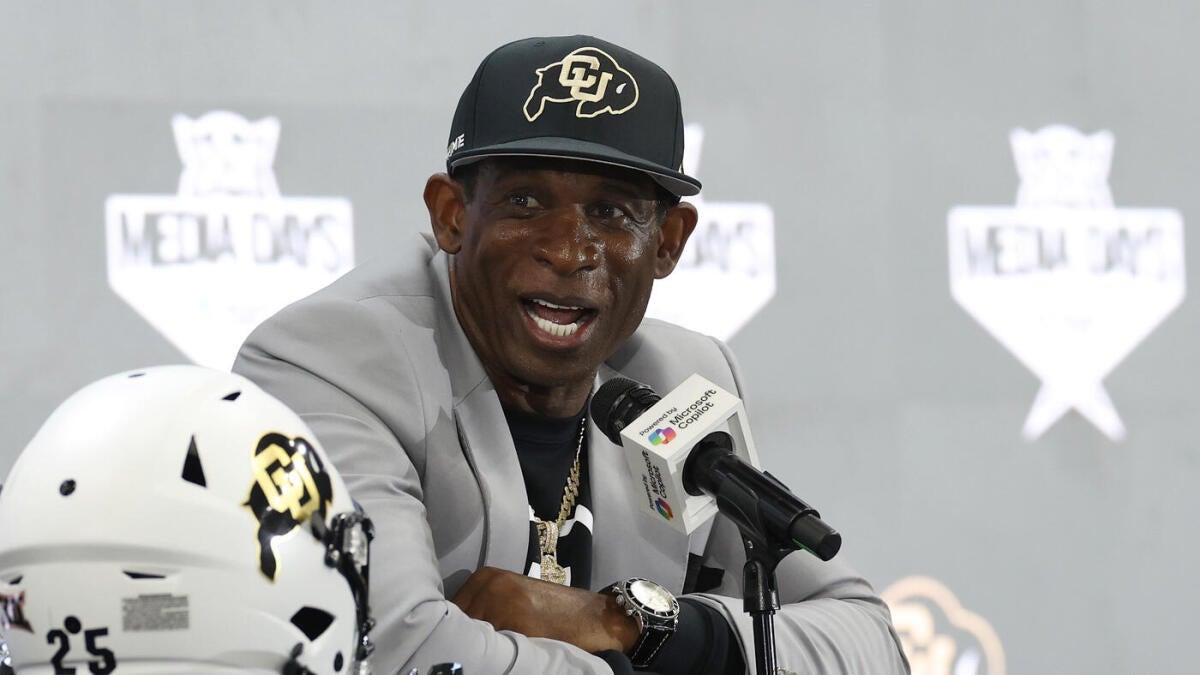Deion Sanders’ appearance at the 2025 Big 12 Media Days was a spectacle that transcended the typical pre-season event. It was a masterclass in controlling the narrative, a display of confidence, and a glimpse into the evolving persona of one of college football’s most polarizing figures. Beyond the flashy entrance and the media frenzy, Sanders’ presence carried significant implications for Colorado Buffaloes and the broader landscape of college football. His statements, both direct and evasive, offered insights into his coaching philosophy, the challenges ahead, and the opportunities that lie within the Big 12 Conference.
Sanders’ arrival at the Big 12 Media Days was meticulously orchestrated to command attention. His opening remarks, where he acknowledged fellow coaches and highlighted his team’s achievements, were a strategic move to position himself as a respected figure within the conference. This gesture was seen by many as a step forward in his evolution as a coach, particularly after a somewhat contentious transition to Boulder. By setting the tone early, Sanders established himself as the central figure of the event, ensuring that the focus remained on his vision for the Buffaloes. His ability to command the room underscored his understanding of the power of perception in shaping the narrative around his program.
One of the most anticipated aspects of Sanders’ appearance was his response to questions about his health. Having faced serious health issues in recent years, including complications from blood clots that led to toe amputations, his well-being has been a constant concern. His absence from practices and media events leading up to the Big 12 Media Days had fueled speculation about his readiness for the season. However, when directly questioned about his health, Sanders deflected, stating that he was not there to discuss it. This avoidance frustrated some reporters, who felt the topic was legitimate given its potential impact on the team. Yet, it also highlighted Sanders’ determination to control the narrative, ensuring that the conversation remained focused on his team’s performance rather than his personal health struggles.
The quarterback situation at Colorado emerged as one of the most intriguing storylines from the Big 12 Media Days. Sanders brought both Julian Lewis and Kaidon Salter to the event, signaling that the competition for the starting role remained unresolved. This decision generated significant buzz and speculation. Some viewed it as a strategic move to keep both players engaged and motivated, while others saw it as a sign of uncertainty and a lack of a clear frontrunner. Sanders’ handling of the quarterback battle has been characterized by his trademark blend of confidence and showmanship. He has publicly praised both players, emphasizing the importance of competition while carefully avoiding any definitive statements about his ultimate decision. This approach has kept the media and fans guessing, maintaining a sense of intrigue around the position.
Sanders did not shy away from addressing the contentious issue of Name, Image, and Likeness (NIL) in college football. He was blunt in his criticism, calling the current state of NIL unfair and unsustainable. He argued that spending decides who makes the College Football Playoff, creating an uneven playing field where financial resources outweigh talent and coaching. This stance resonated with many coaches and fans who believe that NIL has distorted the competitive balance in college football. Sanders’ comments were seen as a call for greater regulation and reform, aimed at creating a more level playing field for all programs. His willingness to address this issue head-on demonstrated his commitment to advocating for systemic change within the sport.
The absence of Sanders’ sons, Shedeur and Shilo, from the Colorado program presents a new challenge for him as a coach. For the past two seasons, their presence on the team added a unique dynamic, blending family ties with the high-pressure world of college football. With both sons now pursuing NFL careers, Sanders must adapt to a new coaching environment, relying on different leaders and establishing a new sense of camaraderie. This shift offers an opportunity for Sanders to prove his coaching acumen beyond his family connections. It also allows him to demonstrate his ability to build a sustainable program that thrives independent of personal relationships.
Colorado’s return to the Big 12 marks a significant shift for the program. After years in the Pac-12, the Buffaloes are now navigating a new conference with different rivals and a competitive landscape. The Big 12 is known for its high-scoring offenses and passionate fan bases, creating a challenging environment for Colorado. Sanders acknowledged the strength of the Big 12, giving “props” to other coaches in the league. He understands the importance of making a strong first impression in the conference, knowing that the Buffaloes will be under intense scrutiny. Their performance in the upcoming season will be crucial in shaping their reputation within the Big 12. Sanders is determined to prove that Colorado can compete with the best teams in the conference, dispelling any notion that they are merely a novelty act.
Deion Sanders is more than just a football coach; he is a cultural icon. His charisma, style, and willingness to speak his mind have made him a media magnet, attracting attention and generating headlines wherever he goes. This ability to command attention has been both a blessing and a curse for Sanders and his program. On one hand, it has brought unprecedented exposure to Colorado, attracting recruits and generating revenue. On the other hand, it has created a circus-like atmosphere around the program, with constant media scrutiny and distractions. Sanders has shown an uncanny ability to manage the media, using his platform to promote his program and control the narrative. He understands the power of social media, leveraging it to connect with fans and recruits. However, he also knows when to draw the line, refusing to answer questions that he deems inappropriate or irrelevant.
Sanders’ journey at Colorado is far from over. He faces significant challenges, including navigating the complexities of NIL, adapting to a new conference, and proving that he can build a sustainable program. However, he also has a unique opportunity to create a lasting legacy, transforming Colorado into a national powerhouse and redefining the role of the modern college football coach. His legacy hinges on his ability to translate his vision into tangible results on the field. Whether he can achieve this remains to be seen, but one thing is certain: Deion Sanders will continue to be a force to be reckoned with, both on and off the field.
Deion Sanders’ appearance at the 2025 Big 12 Media Days was a performance that reaffirmed his commitment to Colorado and set the stage for what promises to be a captivating season. While his detractors may dismiss him as all hype and no substance, it is undeniable that Sanders has injected excitement and energy into college football. His ability to command attention, control the narrative, and address pressing issues within the sport has solidified his status as a transformative figure in the game. Whether he can translate that energy into wins remains to be seen, but one thing is clear: Deion Sanders will continue to shape the landscape of college football in ways that extend far beyond the X’s and O’s.





